- Home
- David Gemmell
White Wolf: A Novel of Druss the Legend dt-10 Page 20
White Wolf: A Novel of Druss the Legend dt-10 Read online
Page 20
‘You are a man who fell off your horse,’ said the newcomer, his voice even. ‘These people have been attacked by beasts, and also by men who behaved like beasts. They are weary, frightened and hungry. They seek only the shelter of the city.’ Without another word the man walked past Cadis and approached Sergeant Shialis. ‘I remember you,’ he said. ‘You led a counter attack on a bridge in Pashturan five… six years ago. Took an arrow in the thigh.’
‘Indeed I did,’ said Shialis. ‘Though I don’t remember you being there.’
‘It was a brave move. Had you not held that bridge your flanks would have been turned and what was merely a defeat would have become a rout. What is it that you do here?’
‘We’re hunting beasts.’
‘We fought them last night. They moved off towards the north.’
Behind the two men Cadis Patralis had almost reached breaking point.
He had fallen from his horse, been laughed at, and now he was being ignored. Gripping the hilt of his cavalry sabre he made to move forward. A huge hand descended on his shoulder, stopping him in his tracks.
‘Been a soldier long, laddie?’ Cadis turned and looked into eyes the colour of a winter sky. The face that framed them was old, deep lines carved on the features. The man had a black and silver beard, and wore a black helm, emblazoned with an axe, flanked by grinning silver skulls. ‘I’ve been a soldier most of my life,’ continued the man. ‘I’ve carried this axe across… well, I don’t rightly know how many lands.’ The warrior raised the weapon and Cadis found himself looking at his own reflection in the shining blades. ‘Never learned as much as I should. One truth, though, that I have found, is that it’s always best to leave anger at home. Angry men are stupid men, you see, laddie. And in wars it’s usually the stupid who die first. Not always, mind. Sometimes the stupid ensure that others die first. But the principle remains. So, how long have you been a soldier?’
Cadis felt a trembling begin in his stomach. There was something about the man that was leaching away his courage. He made one last attempt to regain control of the situation. ‘Unhand me,’ he said. ‘Do it now.’
‘Ah, laddie, if I do that,’ said the man amicably, his voice low, ‘then within a few heartbeats you’ll be dead. And we don’t want that, do we?
You’ll insult that fine young fellow talking to your sergeant, and he’ll kill you. Then matters will turn ugly and I’ll be obliged to use old Snaga on your troops. They seem like good boys, and it would be a shame to see so much unnecessary bloodshed.’
‘There are forty of us,’ said Cadis. ‘It would be insane.’
‘There won’t be forty at the close, laddie. However, I am now done talking. What happens now is up to you.’ The huge hand lifted from Cadis’s shoulder and the massive figure stepped away.
The young man stood for a moment, then took a deep breath. A cool breeze touched his skin and he shivered. He looked across at the woman and the child, saw the fear in her eyes, and felt the first heavy touch of shame. He walked over to them, offering a bow. ‘My apologies, lady,’ he said. ‘My behaviour was boorish. I am sorry if I frightened your child.’
Then he walked to his horse and stepped up into the saddle. Angling his mount he approached his sergeant. ‘Time to leave,’ he said.
‘Yes, sir.’
Cadis led the troop back down the hill and off towards the northwest and the waiting city.
‘What did he say, sir?’ asked Shialis, riding alongside.
‘Who?’
‘Druss the Legend.’
Cadis felt suddenly light-headed. ‘ That was Druss? The Druss? Are you sure?’
‘I knew him, sir. Years ago. No mistaking him. What did he say? If you don’t mind me asking?’
‘I don’t mind, sergeant. He gave me some advice about soldiering. Said to leave anger at home.’
‘Good advice. You mind if I say something else, sir?’
‘Why not?’
‘That was a noble gesture, when you apologized to the mother. A lesser man wouldn’t have done that.’ Shialis suddenly smiled. ‘Advice from Druss the Legend, eh? Something to tell the kids one day.’
There would be no children to tell.
Four months later Cadis Patralis would die fighting, back to back with Shialis, against the invading army of the Witch Queen.
Rabalyn missed the company of the twins. They had said goodbye at the city gates, and had left with Garianne, heading for the southern quarter.
He had enjoyed talking to them. Jared treated him like an adult, never speaking down to him. And Nian, though simple, was always warm and friendly.
His feeling of loss soon evaporated, replaced by a sense of wonder.
Having never before seen a city Rabalyn could scarce believe his eyes. The buildings were monstrously large, towering and immense. There were temples, topped by massive statues, and houses boasting scores of windows and balconies. Rabalyn had always believed that the three-storey home of Councillor Raseev had been the height of magnificence. Here it would look like a tiny hovel. Rabalyn stared at one palace as they passed, and counted the windows. Sixty-six. It was hard to believe that any family could have grown so large as to need a home like this.
Beyond these magnificent buildings they came to narrower streets, the houses close packed and tall, the roads of cobbled stone. Rabalyn stayed close to Skilgannon, Druss and Braygan, and wondered how so many people could live in such a place without becoming lost. Roads met and intersected, flowing around the buildings like rivers. There were people everywhere, and many soldiers with bandaged wounds. Most of the shops were empty of produce, and people gathered in crowds to barter or beg for what food there was to be had.
The axeman led them out along a broad avenue, and down through a long stretch of parkland. It must have been beautiful before the war, thought Rabalyn, for there were statues and pathways, and even a fountain at the centre of a lake. Now, however, tents had been pitched on the grassy areas and hundreds of downcast and weary people were milling around them.
‘They are so sad,’ said Rabalyn. Skilgannon glanced at him.
‘They’d have been sadder still if they’d had better leaders,’ he said.
‘How can that be true?’ asked the youth.
‘Think on it a while,’ replied the former priest.
They walked on for more than a mile, coming at last to a gated area, before which stood two tall guards, dressed in red cloaks and silver helms.
One of them saw Druss and smiled. He was tall and slim, and sporting a black trident chin beard. ‘Surprised to see no-one’s killed you yet, axeman,’ he said.
‘Heaven knows they’ve tried,’ answered Druss, with a grin. ‘They just don’t breed them tough any more. Milkmaids in armour now. Just like you, Diagoras.’
‘Aye, you ancients always say things were better in the old days,’ replied the man. ‘I don’t think it’s true, though. I reckon young warriors look at you and are reminded of their grandfathers. Then they can’t possibly fight you.’
‘Maybe so,’ agreed the axeman. ‘At my age I’ll take any advantage I can get. Any word on Orastes?’
The guard’s expression changed, the smile fading. ‘Not exactly. His servant has been found. He’s alive, but barely. He was in the arena dungeons. The Datians discovered him there when they opened the prisons.’
‘In the dungeons? That makes no sense. Where is he now?’
‘Being cared for at the White Palace,’ Diagoras told him. ‘I’ll arrange a pass for you tomorrow. Where are you heading?’
‘The Crimson Stag on the west quay. Do they still have food?’
‘Aye, but not the menu they had. Things will ease now the Datians have lifted the blockade. Six ships have already unloaded. Old Shivas will have been prowling the dock to restock his larders. I’ll come by after my Watch and help you down a flagon or ten.’
‘Ah, laddie,’ chuckled Druss, ‘in your dreams. One sniff of a wine cork and youngsters like you slide under the table. H
owever, you buy the wine, and I’ll teach you how it should be drunk.’
‘Let’s say that the last person standing can forget the bill,’ offered Diagoras.
‘That’s what I did say.’
Rabalyn watched the exchange. As the two men spoke he saw the Drenai soldier’s eyes constantly flick towards Skilgannon, who was standing some distance away, chatting to Braygan.
‘Will your companions be travelling with you to the Crimson Stag?’
asked Diagoras.
‘Not all of us. The little priest is heading for the Street of Vines, and his church elders. Is there a problem?’
‘The warrior with him. I have seen him before, Druss. I was stationed in Perapolis for two years. We left just before the end. The Naashanites granted the embassy and its staff safe passage through their lines. I saw the Damned as we rode through. Not a man I’d soon forget.’ Druss glanced back at Skilgannon.
‘Maybe you are wrong.’
‘I don’t believe so. I’ll let him through if you vouch for him.’
‘Aye, I’ll do that. Best you report his presence to your superiors, though.’
Diagoras nodded, and pushed open the gates. ‘I’ll see you after dark.’
‘Bring enough coin to pay the bill.’
‘I’ll bring a pillow too, so that your old head can rest on it as you sleep under the table.’
Druss clapped the man on the shoulder and strolled through the gates.
Skilgannon and Braygan followed him, Rabalyn bringing up the rear.
The light was fading as they reached a second set of gates, blocking the way across an arched bridge over a river. Here there were more guards, powerful men with blond beards and pale blue eyes. They were wearing long mail-ring tunics and horned helms.
Druss spoke to them, and once more the gates were opened. ‘The Street of Vines is across the bridge and the first turning on the left,’ Druss told Braygan. ‘Your church building is a short way along.’ The little priest thanked him, then swung to Skilgannon, offering his hand. The warrior shook it.
‘Thank you for all you have done for me, Brother,’ said Braygan. ‘May the Source be with you on your travels.’
Skilgannon smiled wryly, but did not answer. ‘Will you take your vows?’
he asked after a moment.
‘I think that I will. Then I will return to Skepthia, and try to be of service.’ Braygan offered his hand to Rabalyn. ‘You are welcome to come with me,’ he said. ‘The elders may know the whereabouts of your parents.
If not they can give you shelter while you try to find them.’
Rabalyn shook his head. ‘I don’t want to find them.’
‘If you change your mind I shall be here for some days.’ With that the little priest walked through the gates. He paused once on the bridge to look back and wave. And then he was gone.
CHAPTER TEN
THE CRIMSON STAG TAVERN WAS AN OLD BUILDING, L-SHAPED
AND double-storeyed, constructed close to the west quay, overlooking the harbour and the sea beyond. It had long been the haunt of Drenai officials and soldiers stationed in the embassy quarter of the city. Such was its reputation for food, wine and ale that even Vagrian officers used it.
Normally the antipathy between soldiers of Vagria and Drenan would have precluded any such common ground. Though none now living could recall the Vagrian-Drenai wars the ancient enmity between the peoples continued. Occasionally there were even border skirmishes.
There were, however, no fights at the Crimson Stag. Not one man from either camp would risk being barred by Shivas, the sour-faced owner. His cooking was as sublime as his temper was dark. Added to which his memory was known to be long indeed, and a man refused custom once would never be forgiven.
Druss and Skilgannon sat at a table overlooking the moonlit harbour.
Despite the coming of night, ships were still being unloaded at the quayside, and wagons were drawn up to ferry food back out into the hungry city.
Skilgannon sat quietly watching the dockers. His heart was heavy. He had not expected to miss the little priest. Yet he did.
Braygan was the last link to a gentle life Skilgannon had tried so hard to embrace.
‘ We are what we are, my son. And wolves is what we are.’
The tavern was filling up. By the far wall a group of Vagrian soldiers were drinking and laughing. Skilgannon glanced across at them. Many still wore their tunic-length mailshirts, and one still had on his horned helm of reinforced brass. Elsewhere soldiers and officials of other races were sitting quietly, some already eating, others enjoying a goblet of wine or a tankard of ale. ‘How many nations are stationed in the embassy quarter?’ he asked the axeman. Druss shrugged.
‘Never counted them.’ He glanced around the tavern. ‘Mostly I only know those from Lentria and Drenan. There must be more than twenty embassies. Even one from Chiatze.’
Druss lifted his wine goblet and drained it. Skilgannon looked at him.
Without his helm and steel-reinforced jerkin the axeman looked what he was — a powerful fifty-year-old man. He could have been a farmer, or a stonemason. Save for the eyes. There was something deadly in that iron gaze. This was a man — as the Naashanites would say — who had looked into the eyes of the Dragon. ‘Are you the Damned, laddie?’ asked Druss suddenly.
Skilgannon took a deep breath, and met Druss’s gaze. ‘I am,’ he replied.
‘Do they lie when they talk of Perapolis?’
‘No. There is not a lie which could make it any worse.’
Druss signalled a serving maid. The menu was not extensive and the axeman ordered eggs and salt beef. He glanced at Skilgannon. ‘What are you eating?’
‘The same will be fine.’
When the serving maid had departed Druss refilled his goblet from a flagon and sat quietly, staring out of the window. ‘What are you thinking?’
asked Skilgannon.
‘I was thinking of old friends,’ said Druss. ‘One in particular. Bodasen.
Great swordsman. We fought side by side all across this land. No give in the man. A fine soldier and a true friend. I think of him often.’
‘What happened to him?’
‘I killed him at Skein. Can’t change it. Can’t help regretting it. The boy tells me you were a priest for a while. Brother Lantern, I think he said.’
‘A man should always try new things,’ said Skilgannon.
‘Don’t make light of it, laddie. Were you touched by faith, or haunted by guilt?’
‘Probably more guilt than faith,’ admitted Skilgannon. ‘Are you intending some subtle lecture at this point?’
Druss laughed, the sound unforced and full of genuine humour. ‘In all my long life no-one has ever accused me of that, boy. A man who uses an axe doesn’t generally build a reputation for subtlety. You want me to lecture you?’
‘No. There is nothing anyone could say to me that I haven’t already told myself.’
‘Are you still with the Naashanite army?’
Skilgannon shook his head. ‘The Queen wishes me dead. I am outlawed in Naashan. I’m told there is a large price on my head.’
‘Then you are not here as a spy?’
‘No.’
‘Good enough.’ Druss topped up his goblet. Skilgannon smiled.
‘Rabalyn tells me you are to be involved in a drinking contest later.
Shouldn’t you hold off on that wine?’
‘A few sips to prepare the belly. This is Lentrian red. I’ve not tasted a drop for two months. Are you not a drinker?’
Skilgannon shook his head. ‘It tends to make me argumentative.’
Druss nodded. ‘And a man with your skills can’t afford meaningless arguments. I understand that. I have heard tales of you and the Witch Queen. It is said you were her champion.’
‘I was. We were friends once — in the days when she was hunted.’
‘It is said you loved her.’
Skilgannon shook his head. ‘That doesn’t come clo
se. Thoughts of her fill my waking hours, and haunt my dreams. She is an extraordinary woman, Druss; courageous, clever, witty.’ He fell silent for a moment.
‘Compliments like this fall so far short of the actuality that they seem like insults. I say she was courageous, but it does not paint the reality. I never met anyone more brave. At the battle of Carsis, with the left in rout and the centre crumbling, her generals advised her to flee the field. Instead she donned her armour and rode to the centre where all could see her. She won the day, Druss. Against all the odds.’
‘Sounds like you should have married her. Or did she not feel the same way towards you?’
Skilgannon shrugged. ‘She said she did. Who can know? But it was politics, Druss. Back in those dangerous days she needed allies. The only treasure she possessed then was her blood line. Had we been wed she could never have gathered enough troops to win back her father’s throne.
The princes and earls who fought under her banner all hoped to win her heart. She played them all.’
The meal arrived and the two men ate in silence. Finally Druss pushed away his plate.
‘You did not mention your own actions at Carsis. The story I heard was that you rallied the broken left flank and led a counter charge. It was that which turned the battle.’
‘Yes, I’ve heard that story,’ said Skilgannon. ‘It came about because men write the histories. They find it hard to praise a woman in a man’s world. I am a soldier, Druss. It is in my blood. Had Jianna not ridden to the front and given the men fresh courage, no action of mine would have made a jot of difference. Bokram’s forces had broken the left. Men were fleeing through the forest. When the Queen arrived Bokram saw her, and pulled back half the cavalry giving chase on the left flank. He turned them back towards the centre. It wasn’t a foolish move. Had he succeeded in killing Jianna he could have hunted down the deserting warriors at his leisure. As it was I had a little time to regroup some of the fleeing men. And, yes, it was the counter attack that sundered Bokram’s army. Had the Usurper had more courage he would still have won the day. Such is the way of history, though. Ultimately the coward rarely succeeds.’

 Bloodstone
Bloodstone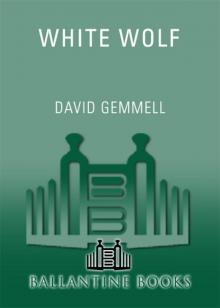 White Wolf
White Wolf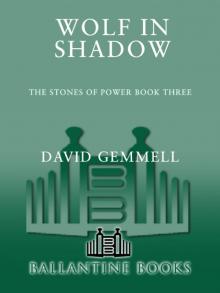 Wolf in Shadow
Wolf in Shadow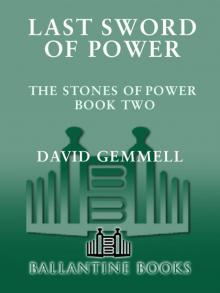 Last Sword of Power
Last Sword of Power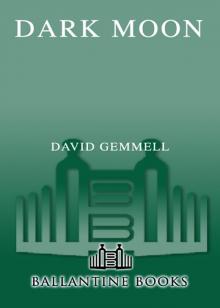 Dark Moon
Dark Moon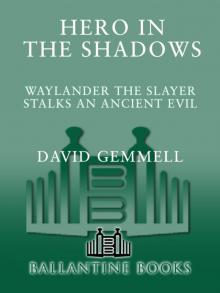 Hero in the Shadows
Hero in the Shadows Gemmell, David - Drenai 09 - Hero In The Shadows
Gemmell, David - Drenai 09 - Hero In The Shadows Waylander
Waylander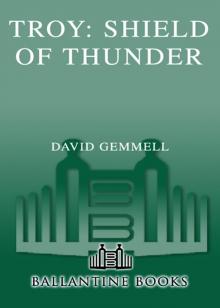 Shield of Thunder
Shield of Thunder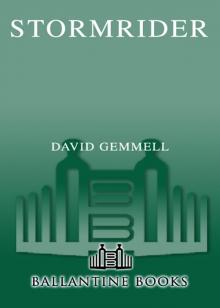 Stormrider Stormrider
Stormrider Stormrider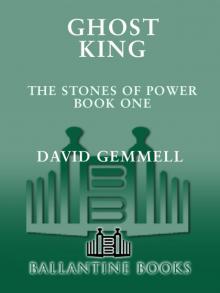 Ghost King
Ghost King Legend
Legend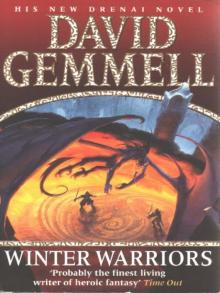 Winter Warriors
Winter Warriors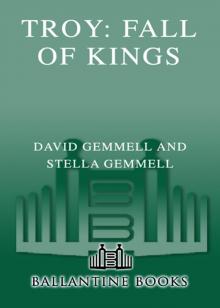 Fall of Kings
Fall of Kings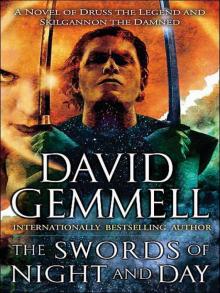 The Swords of Night and Day
The Swords of Night and Day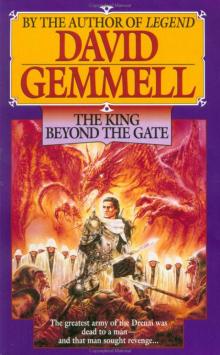 The King Beyond the Gate
The King Beyond the Gate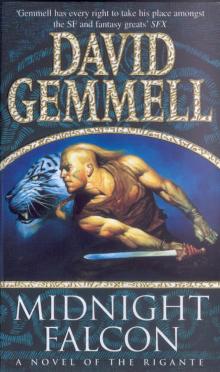 Midnight Falcon
Midnight Falcon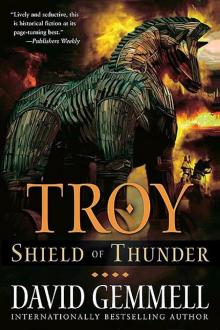 02 - Shield of Thunder
02 - Shield of Thunder In the Realm of the Wolf
In the Realm of the Wolf Ravenheart
Ravenheart The First Chronicles of Druss the Legend
The First Chronicles of Druss the Legend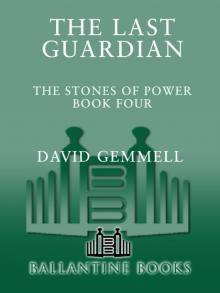 Last Guardian
Last Guardian Stormrider
Stormrider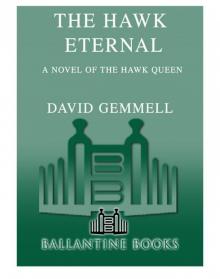 The Hawk Eternal
The Hawk Eternal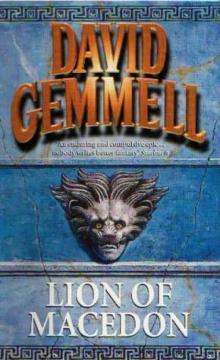 Lion of Macedon
Lion of Macedon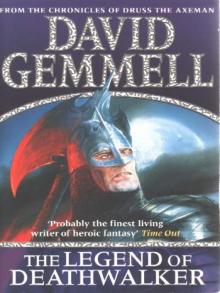 The Legend of Deathwalker
The Legend of Deathwalker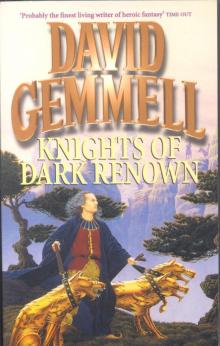 Knights of Dark Renown
Knights of Dark Renown Echoes of the Great Song
Echoes of the Great Song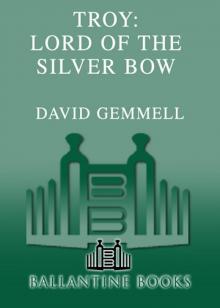 Lord of the Silver Bow
Lord of the Silver Bow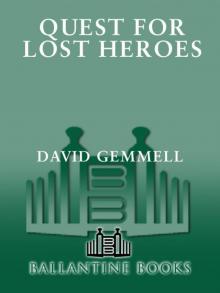 Quest for Lost Heroes
Quest for Lost Heroes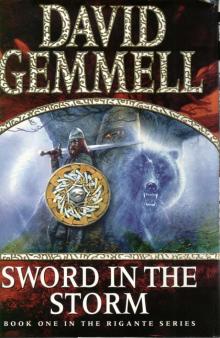 Sword in the Storm
Sword in the Storm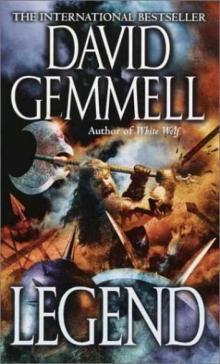 Drenai Saga 01 - Legend
Drenai Saga 01 - Legend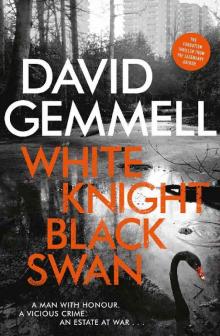 White Knight/Black Swan
White Knight/Black Swan![[Troy 02] - Shield of Thunder Read online](http://i1.bookreadfree.com/i/03/19/troy_02_-_shield_of_thunder_preview.jpg) [Troy 02] - Shield of Thunder
[Troy 02] - Shield of Thunder Lord of the Silver Bow t-1
Lord of the Silver Bow t-1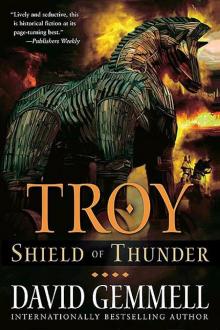 Shield of Thunder t-2
Shield of Thunder t-2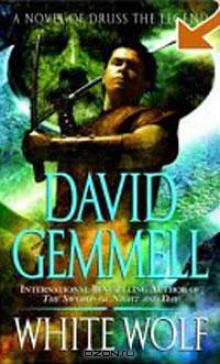 White Wolf: A Novel of Druss the Legend dt-10
White Wolf: A Novel of Druss the Legend dt-10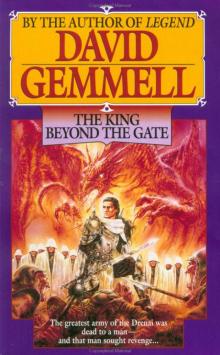 Drenai Saga 02 - The King Beyond the Gate
Drenai Saga 02 - The King Beyond the Gate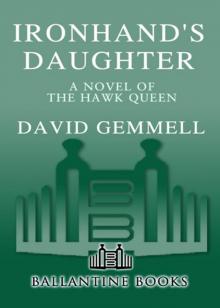 Ironhand's Daughter
Ironhand's Daughter Gemmell, David - Drenai 06 - The First Chronicles of Druss the Legend
Gemmell, David - Drenai 06 - The First Chronicles of Druss the Legend The Last Guardian
The Last Guardian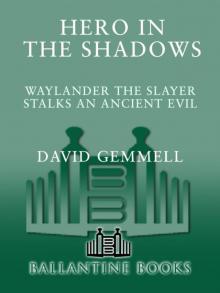 Hero in the Shadows: A Waylander the Slayer Novel
Hero in the Shadows: A Waylander the Slayer Novel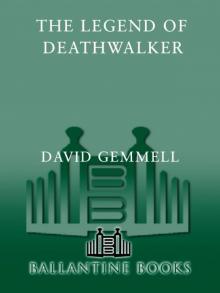 The Legend of the Deathwalker
The Legend of the Deathwalker